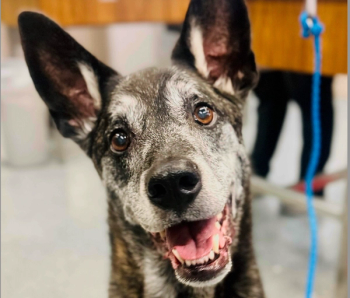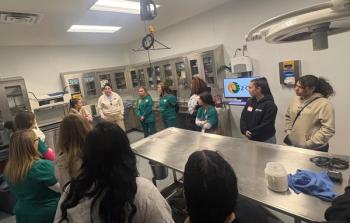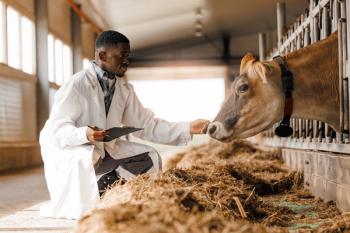
Choice veterinary jobs hard to find in tough economy
As new veterinary graduates prepare to enter the work force this month, they are finding that jobs are not as plentiful as they had hoped.
NATIONAL REPORT — As new veterinary graduates prepare to enter the work force this month, they are finding that jobs are not as plentiful as they had hoped.
Job search: DVM graduates, like Lee Ann Williams, find tight job market.
Although experts agree that positions are out there, they may not be the right fit for all students. And while previous graduates may have had four or five job opportunities to choose from, this year's grads may only have one or two.
Despite the downtrodden economy, experts say there are many opportunities in the veterinary market, but a job search might have to be expanded geographically.
Still, try telling that to the graduates who have yet to find a position or those who thought they had one, only to find they lost it.
Smile: Lee Ann Williams, an '09 graduate of Virginia-Maryland Regional, was able to find a job through word of mouth.
Josh Bowden, a 2009 graduate of Iowa State University College of Veterinary Medicine, was fairly confident he had secured a job in Wyoming, where he had completed a preceptorship.
He found out last fall that it wasn't going to happen.
"Because of the economy, it ended up falling through," he says.
Perhaps because Bowden was open to moving pretty much anywhere in the United States, he did find another job fairly easily. He will be moving to Missouri to work for a large hog-producing company starting June 1.
His classmates weren't all as lucky.
"I know of several people who thought they found a mixed-animal job, but the people they were talking with backed off. They were told they were not interested in hiring anybody because of the economy."
Not being able to pick and choose freely is frustrating for Bowden and his classmates.
"Even though we've always been told the last three years that there is a shortage of mixed-animal and food-animal vets, especially in rural areas, some of those jobs are harder to come by because of the economy," Bowden laments.
Lee Ann Williams, a 2009 graduate of Virginia-Maryland Regional College of Veterinary Medicine, which is increasing its first-year class size from 90 to 95 students in the fall, knows about the trials of trying to find a job as a companion-animal veterinarian.
She searched five months before securing a position in a private practice in the suburbs of Richmond, Va., in May.
With no real job postings to speak of, a lot of her search included cold calls, sending unsolicited resumes and just word of mouth.
"I had a hard time," she admits.
But Williams also was looking specifically in the Richmond-area.
"Depending on which market you were looking in, some states had tons of jobs open," she says. "If you wanted to go to New York, there were plenty of jobs there. Richmond has been particularly hard-hit by the economy. No one is actively hiring."
Williams found her job because she "happened to know someone who knew someone" and was able to slip in before the job was posted.
A number of her classmates are still searching.
"We always hear that 'there are plenty of jobs out there,' especially for large-animal vets," she says. "I know of several classmates who are mixed-animal and are having a hard time."
While some could be having trouble because they are area-specific, she knows others who are not and they still haven't found anything.
"I didn't anticipate it being this difficult," Williams says of her search.
Some students, such as Jeanette Schacher, a 2009 Kansas State University College of Veterinary Medicine graduate and Jason Pieper, a 2009 Iowa graduate, opted to find internships upon graduation in order to prepare for a specialty.
Pieper, a small-animal veterinarian, landed one in Aurora, Ill., which is where he wanted to locate.
While getting the internship was fairly easy, given that he already had worked there, he knows of some mixed-animal and large-animal classmates who were having a difficult time finding work.
"Despite the shortage, there weren't that many jobs out there for them," he says.
Schacher went through the Veterinary Internship and Residency Matching program for her internship. While she landed the position she wanted in Washington, D.C., some of her classmates ended up not being matched at all. "One of my really close friends had a lot of problems finding a job," Schacher says.
"She wanted to stay in the Kansas area, but she's going to move to Omaha because it's the only place she could find a job."
The job market
Without a doubt, there are fewer people hiring this year, but there are jobs, says Karen Felsted, CPA, MS, DVM, CVPM and chief executive officer of the National Commission on Veterinary Economic Issues.
"They may have to look a little harder, and they may not be able to be as selective as in previous years, but people are still hiring," she adds.
"Look at the want ads in JAVMA and on AAHA. The numbers are down — a lot," Felsted says.
While Dr. Patricia Wohlferth-Bethke, assistant director of the AVMA membership and field services division, says that classifieds and job postings are down at the Veterinary Career Center, she adds that it is hard to say how much that reflects a drop in the job market.
Graduates looking to enter the corporate side may have better luck with their job search.
Banfield, The Pet Hospital plans to hire more than 200 new graduates this year and 650 doctors total, says Dr. Bob Lester, vice president of veterinary selection for Banfield.
"Our business is booming," he says. "All of us in this profession should be thrilled to be in it. This soft economy confirmed it even further. People will do anything to take care of their pets. They may give up dinner or a movie, but they would do anything for their four-legged friends."
The job market will turn around in some areas of the field, experts say.
"I don't think there are any doubts about the need for veterinarians in research, food supply, government and public health," Felsted says. "In companion-animal, I'm not sure it's that clear."
A work-force study by the National Academy of Sciences is scheduled for release this year and is supposed to evaluate all areas of the profession.
Until then, the debate continues about numbers of companion-animal veterinarians needed for the United States, especially if owners delay retirement because of the drop in the stock market early this year.
"Obviously we will always need more veterinarians coming out of school to replace those who retire or leave the profession," she says.
"But do we really need to increase the overall population of companion-animal veterinarians?"
If hospitals operated more efficiently, perhaps fewer companion-animal veterinarians would be needed, Felsted speculates.
"But if you're a rural, small-animal veterinarian who has been looking for an associate for x number of years, it's very hard for those people to say there is not a shortage," Felsted says.
The future
"We have to look at now, when we are in the middle of a recession, vs. what it was a year or two ago and what it will be in a year or two from now. This year is not really relevant," says Marguerite Pappaioanou, executive director of the Association of American Veterinary Medical Colleges (AAVMC).
In general, the job market has been very bright for small-animal veterinarians, she says.
"It's really been a buyers' market, with lots of jobs to choose from. It will be that way again."
Almost as proof of that confidence in the profession, many colleges are increasing their class sizes to help meet the demand for veterinarians.
Veterinary colleges in Texas, Oklahoma, Alabama, North Carolina and Georgia are all adding, as well as Purdue, Cornell and Virginia-Maryland.
"Quite a number of schools plan to add," she says. "Some are planning smaller additions to classes, some are looking to obtain resources to increase substantially."
As the economy improves, experts anticipate an increase in hiring.
A recent survey shows job seekers are using many methods to find employment, says Wohlferth-Bethke.
"Online job boards are a very popular way to locate a position as well as print classified ads," she says. "Sending resumes or e-mails to all practices in a specific area helped some seekers. Networking at conferences and word of mouth from colleagues helped as well."
Newsletter
From exam room tips to practice management insights, get trusted veterinary news delivered straight to your inbox—subscribe to dvm360.






